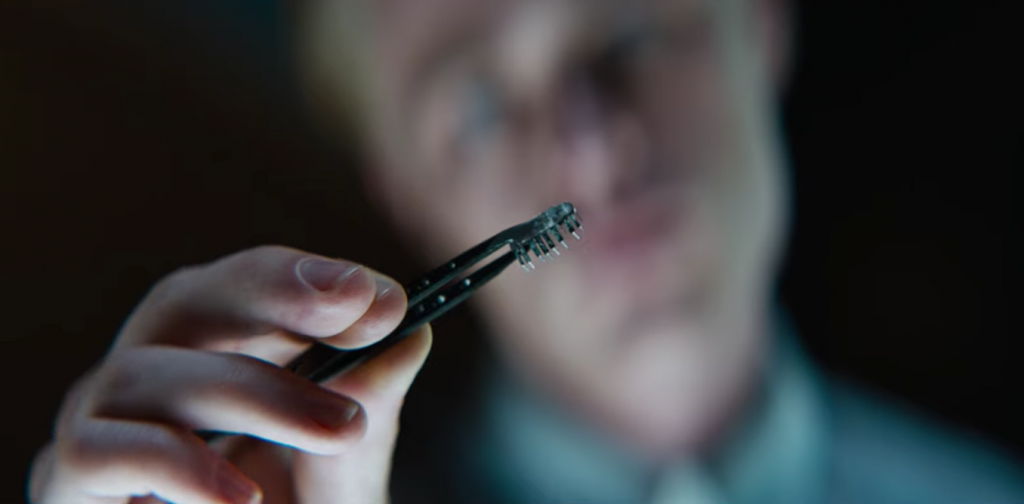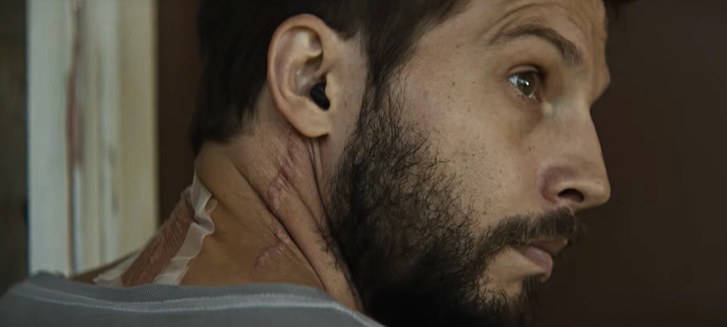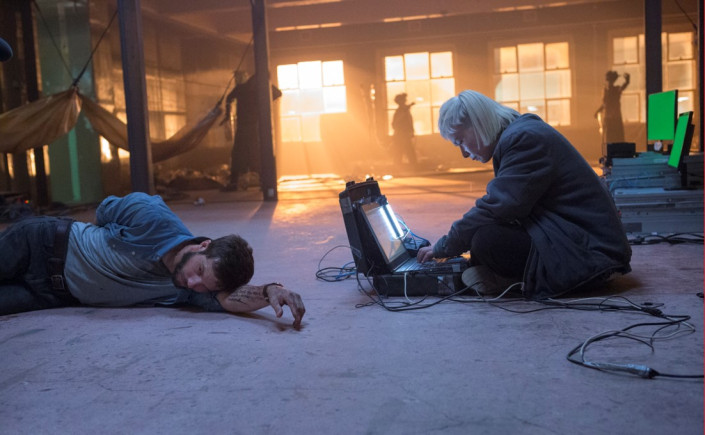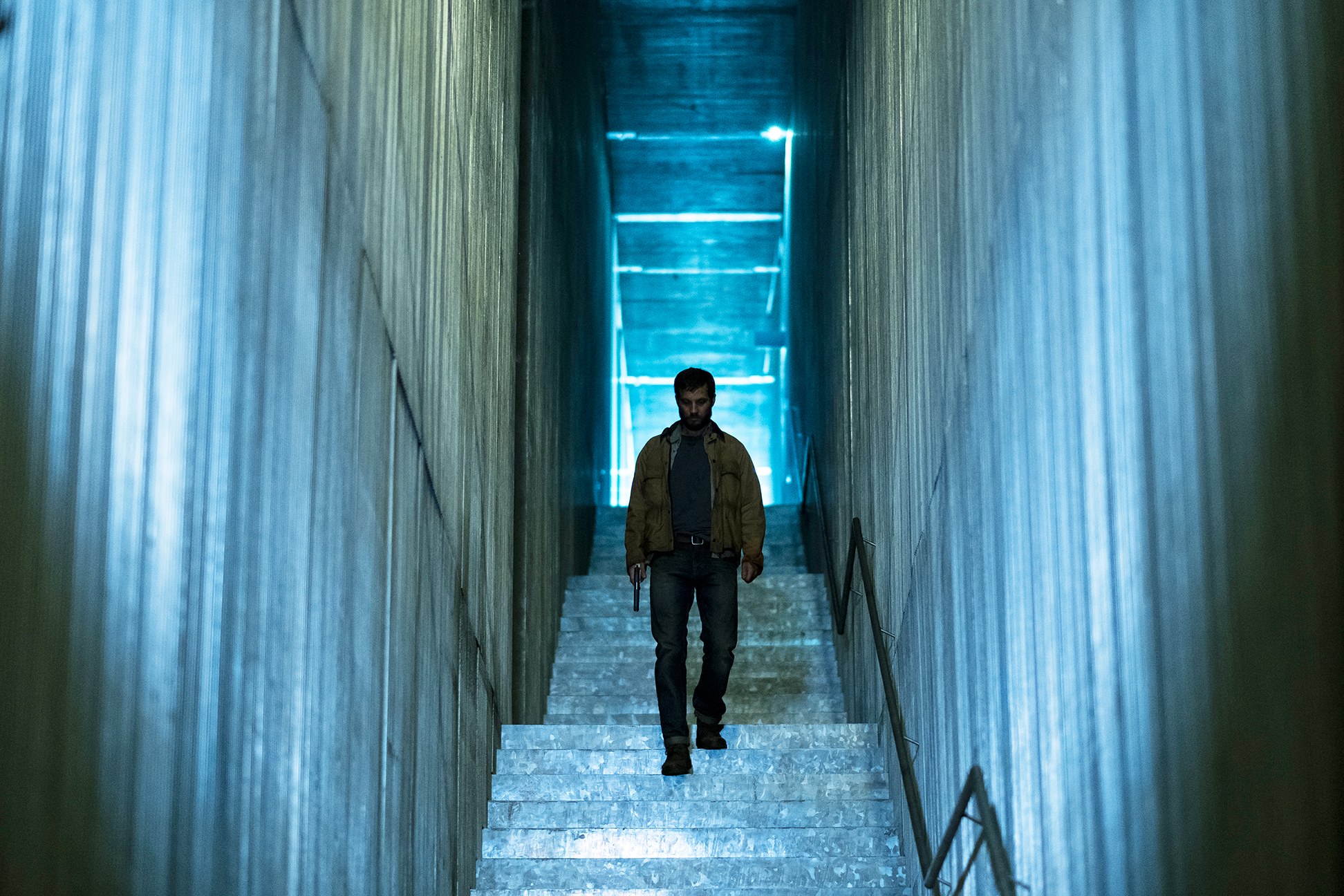Henry and DeKev are to get the credit for this particular movie recommendation. Good on ya gents. Well done.
OK, so what do we have here today? Upgrade – a movie starring the ULTRA famous Logan Marshall-Green. Wait, you don’t know him? Then, I’m sorry sir, but you just outed yourself as a non-THiNC.er. So yeah, welcome to THiNC…stranger. gah. Hahaha, kidding. (sort of.) Mr. Marshall-Green is the phenom from the ultra brilliant movie The Invitation. Which, I liked so much that I went and found Phil Hay (the screenplay writer, who, happens to be married to Karyn Kusama, the co-writer, and director of Invitation…. and also the director of Destroyer, as well as my new favorite TV show Halt and Catch Fire.) and talked with him about it. Adore that movie, The Invitation is brilliant, and Logan was really convincing in that convoluted and ultra-complicated setup. He does well here too – even though Upgrade is the Yin to The Invitation’s Yang. Trailer:
Quick Upgrade Recap:
The story of Upgrade kicks off in the near future with Grey and Asha Trace delivering an old manual car to Eron Keen, the Bill Gates of the day. And on the way home the Trace’s are attacked, and Asha is killed, while Grey is paralyzed by their attackers. Eventually, Handley offers Grey a way to walk again through his secret Stem chip. And, after his surgery, he is forced to keep it a secret by Keen – which causes complications for him with the detective searching for his wife’s murderers. With Grey’s newfound strength and mobility, he’s determined to chased down the murderers as well. Which keeps putting him in the “wrong place at the wrong time.”
After chasing down a couple of the individuals, and killing them (or after Stem kills them, either way) he eventually has his Stem shut down by Eron. But not before Stem helps him remove the guards limiting the Stem, and freeing them from Eron’s grasp. Eventually, Grey chases down Fisk and we realize that this UPGRADED thing is something of a cult. And when Grey and Fisk fight they are evenly matched, but Grey outmaneuvers Fisk and kills him.

Upgrade Complications Explained
One of the most complicated elements with regard to the movie Upgrade is the fact that, with regard to Grey and his Stem, we are never sure who is doing what. When Grey tortures a witness, he does it with hundreds of small stab marks to his face. But it’s OK right? Because it was Stem that did it, not Grey. Or maybe he was complicit via a sin of omission. He did, after all, close his eyes and allowed Stem control after all.
As the movie heads towards its ending, this complication even becomes more convoluted as we learn that now Stem has 100% control, and that it doesn’t need Grey’s permission anymore. And as we follow the leads, further and further down the rabbit hole, the leads ultimately come back to Keen. But when Grey and ostensibly Stem, catch up with Keen, he tells us a story that it was actually Stem that has been in control of Keen’s technology company all along. That Stem has been holding Keen hostage in his own company. Better yet, it was actually Stem that murdered Asha at the outset of the movie.
But why? What was Stem’s objective? Apparently, Stem was in search of a human body to use as its host. And for some reason, Stem chose Grey. So if I understand this correctly, the entirety of this movie is entirely about a computer desiring a physical manifestation of itself in the real world. Is that right? Feels like that was what it was about to me anyway, once all the layers are peeled back.

The Ethics of Commission and Omission
Being a fan of the study of Ethics and Theology, I sort of assume you know what a ton about the various types of failures we are capable of. But maybe you aren’t too familiar. You sort of have to consider our potential ethical failures on a spectrum. The scale starts far on the left where we are not failing, but are doing the right thing. Then, we begin, almost immediately, heading into the realm of sins of omission. Omission just being a fancy theological/Philosophical, 50 cent word for, omitting. But omitting what? Omitting what we should do.
Most of the time, when we consider sin, we think mainly about the big ten or something. You know, the murders, the adulteries, your standard jealousies, and the like. These are all sins of commission. The actions that we just immediately relate to as being bad. Bad actions. Evil we actively drop on our neighbor’s head. But the lack of action is also considered bad in the world of philosophy. The absence of positive actions can be considered sinful. Consider Nazi Germany…the guy running the gas chambers in Auschwitz-Birkenau, Majdanek, etc., was actively sinning. But what about the neighbor of that Jewish family that chose not to hide them? Allowed them to be captured. That is omission. And actually, still a moral failure. Is it as bad as pulling the trigger? No, but literally, it actually doesn’t even matter in theological terms. Not even a little bit. (Which I’d be happy to talk about with you in the comments or off line.)
But what has this got to do with this particular movie? Well, yes, Grey is the afflicted one. His wife is murdered. He is paralyzed. He is the slighted one in this story. And yet, watch his journey from start to finish, and it is just one guy’s stroll from the left to the right of the sins of omission to commission continuum. It starts by his approval to receiving the Stem. And then, from there, he moves rapidly down the hill, rapidly into the land of commission. Which, actually foretells of the ending we are heading towards.
Think about it though – Grey starts out walking the path of all good, minding his own business. Then he accepts this evil entity into his soul. And the next thing we know, he is allowing Stem to murder on his behalf. He dislikes it, but allows Stem to torture his witness and ultimately kill him. Then, the gradual continuum heads him directly off a moral cliff. Remember when Stem can’t figure out a way to beat Fisk? And Grey intervenes to trick Fisk and kill him? He leapt from the world of omission out into the deeper waters of commission.

The Ending of Upgrade Explained
Now, remember, Grey – stop, can I point out just how clever and to the point this name – has wandered off the deep end of the ethical continuum. He has gone from the hero to the anti-hero. In his effort to get justice, he has become the thing he hates.
So, as he is following his leads he ends up on Keen’s doorstep. And when he learns that Keen has actually been blackmailed by Stem. That the thing he hates is actually inside his neck. The one that he has given control to. So Grey kills Eron, and then the real fight begins. Grey and Stem battle for control of Grey’s mind as the machine tries to kill the detective. And Grey wins, managing to shoot himself. But wait, two days later, Grey wakes up, with Asha there, telling him that he was injured badly in the crash but everything was fine now. So, PHEW! Grey just had a horrible dream. And I thought that he had fallen off the moral cliff! But it was all fake-dreamland world. Great twist movie creators!!
But wait. A minute later, we are back in Eron’s home, with Grey and the detective. So what just happened? The battle for control of Grey’s mind was actually one by Stem. And when Grey snaps, Stem feeds Grey the one thing that will feed this false reality, and that is a fantasy of Asha’s return. So Stem is basically keeping Grey prisoner in his own mind in order to take control of his body. And the first thing Stem does with it, is kill Detective Cortez. The End.
Final Thoughts on Upgrade
We, as a society, are enormously afraid of the coming AI revolution tsunamiing our way. As a collective whole we watched recently as our Go grand-masters and the best of our best were systematically dismantled on the playing field. It feels as if this AI fear is now embedded in the zeitgeist of our times. So the movie is definitely a conversation about the robot Armageddon we are afraid of.
But on a deeper level it isn’t about AI at all. It’s actually about our willingness to hand off control of our moral agency in exchange for something else. Our willingness to take the easy road instead of a million small hard choices that leads to the one big correct choice of our lives. It’s about choosing comfort instead of standing up to that racist in the break room. It’s about choosing for that pay bump because you were willing to stab that co-worker in the back. It’s about a million passive omissions that lead to that enormous, and well-justified sin of commission. It’s about doing the right thing in small things, leading to doing the right thing in the big moments.
Or, maybe it’s just a kick ass action film about killer robots. Who knows?
Edited by, CY



